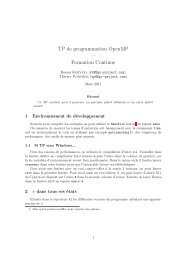Par4All Command Line Interface p4a — HPC Project
Par4All Command Line Interface p4a — HPC Project
Par4All Command Line Interface p4a — HPC Project
You also want an ePaper? Increase the reach of your titles
YUMPU automatically turns print PDFs into web optimized ePapers that Google loves.
advantage of community participation and to avoid capturing users in a proprietary short-term<br />
solution. Specialized target developments and professional support are also available on demand.<br />
The main goal of a source-to-source compiler is to be naturally independent of the target<br />
architecture details and to take advantage of the best back-end tools, such as highly optimized<br />
vendor compilers for a given processor or platform, open-source compilers and tools, high-level<br />
hardware synthesizers, cuda or OpenCL compilers for gpu. At the same time, some architectural<br />
aspects can be expressed or generated in special source constructs to capture architectural details<br />
when needed (simd or accelerators intrinsics). The source-to-source aspect makes <strong>Par4All</strong> de<br />
facto interoperable with other tools as front-end or back-end compilers to build complete tool<br />
chains.<br />
<strong>p4a</strong> is the basic script interface for users who are not interested in pips details but wish to<br />
produce parallel code from user sources.<br />
This script can take C or Fortran source files and generate OpenMP, cuda or OpenCL output<br />
to run on shared memory multicore processors or gpu, respectively.<br />
The output is created in files with the same name as the original ones, with a .<strong>p4a</strong> extension<br />
added before the original extension. The generated files are extracted from a temporary<br />
x.database directory that can be kept for later inspection (standard practice for pips usage).<br />
This script can also be used to call a back-end compiler such as gcc, icc or nvcc to generate<br />
a binary executable. Compiler and preprocessor options can be passed directly to the back-end<br />
compiler via the script.<br />
A CMake build infrastructure can be automatically generated to ease compilation by the backend.<br />
The <strong>Par4All</strong> documentation is available from http://www.par4all.org and more specifically,<br />
this document can be found in pdf from http://download.par4all.org/doc/simple_<br />
tools/<strong>p4a</strong>/<strong>p4a</strong>_script.pdf<br />
Since <strong>Par4All</strong> is a large project in progress with continuous updates, users should refer to the<br />
current release notes and the general documentation on http://www.par4all.org for updates on<br />
the current status and limitations of the tools.<br />
This project is funded through various research projects : French ANR FREIA, European<br />
ARTEMIS SCALOPES, French Images and Network TransMedi@, French System@tic OpenGPU,<br />
French ANR MediaGPU, European ARTEMIS SMECY.<br />
2 Examples and use cases of <strong>p4a</strong><br />
2.1 Automatic parallelization with OpenMP generation<br />
To generate OpenMP code from a Fortran program, use:<br />
<strong>p4a</strong> --openmp example.f<br />
which produces output in the file example.<strong>p4a</strong>.f. Since this is the default behavior, the<br />
--openmp option can be omitted. The compilation process automatically data-parallel do-loops<br />
into OpenMP parallel loops with the correct pragmas and with the privatization of scalar variables.<br />
2.2 Automatic parallelization with CUDA generation<br />
To generate from a C program source a cuda program that is also compiled into an executable,<br />
use:<br />
<strong>p4a</strong> --cuda example.c -o e<br />
which produces an example.<strong>p4a</strong>.cu cuda program source and an e executable that will run on a<br />
gpu. The gpu accelerator support relies on a small <strong>Par4All</strong> Accel interface that connects to the<br />
cuda infrastructure. Data-parallel loops are automatically transformed into cuda kernels that<br />
2



